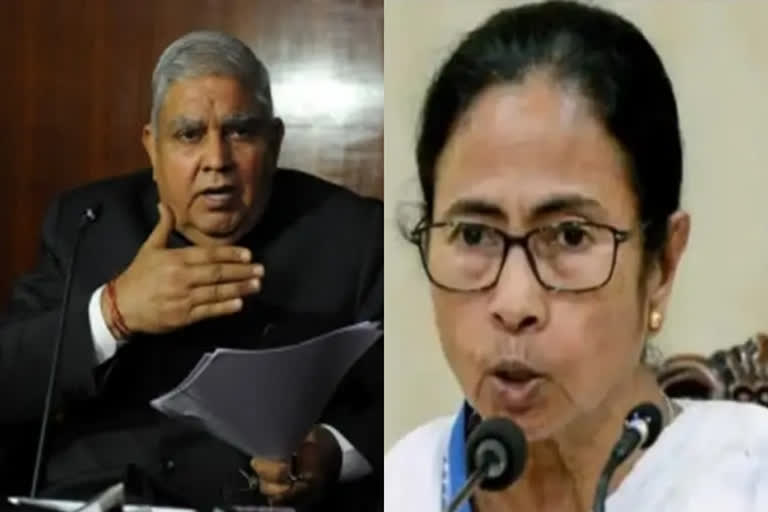Kolkata: From getting into a direct conflict with the Governor way back in 1967 to the recent slugfest over Twitter, the mutual relationship between the constitutional head and the elected chief of the state and the government in West Bengal, has been a bumpy one.
The recent spat between Chief Minister Mamata Banerjee and Governor Jagdeep Dhankhar bears testimony to the fact that nothing is right between Raj Bhavan and Nabanna, the state secretariat.
Be it the swearing of the newly elected legislators where the Chief Minister has alleged that the Governor was trying to drive a wedge between the Speaker and the Deputy Speaker of the Assembly or the Governor questioning the logic behind holding a fresh edition of Bengal Global Business Summit (BGBS), next year.
In a recent tweet, Dhankhar posted his last year's letter to the state Finance Minister and has said, “Concerned at lack of response on critical issues flagged a year ago on five editions of BGBS. Ground reality belies 'resounding success' syndrome. Rule of law, respect for human rights, and democratic values are imperative for investment. Much needs to be done on these fronts.” A furious state government has retorted back and the unending tug-of-war between the two offices is on in Bengal.
Also Read:4th State Finance Commission continued beyond 5-year term in violation of Constitution: Bengal Guv
And it is not new to the state or with Jagdeep Dhankhar. The ruling dispensation always had an uneasy relationship with Raj Bhavan, whenever different political parties were at the hustings – in the Centre and the state. Be it the Bangla Congress (United Front) government headed by Ajoy Kumar Mukherjee in 1967 or the successive Left Front governments headed by Jyoti Basu and Buddhadeb Bhattacharjee or the Trinamool Congress government headed by Mamata Banerjee, Bengal was never at ease with its successive Governors.
When Ajoy Mukherjee took over the office of the Chief Minister in 1967 as the leader of the United Front, then Governor Dharam Veer had directed him to prove his majority on the floor of the Assembly within 72-hours. Mukherjee refused and said he would do so at a scheduled time. Several rounds of spats went on and eventually Dharam Veer recommended suspension of the United Front government.
During the tenure of BD Pande as the Governor of Bengal, then CPI(M) state secretary Promode Dasgupta had been an extreme critic of Raj Bhavan and even went to brand the Governor as an oppressor of the people of Bengal.
1984 saw an interesting twist in the tale between the Governor and then Left Front government. Exercising his right as the Chancellor of Universities, Governor AP Sharma rejected the nomination of Romen Poddar as the Vice-Chancellor of Calcutta University and instead appointed renowned economist Santosh Bhattacharya to the post. Immediately then CPI(M) state secretary Saroj Mukherjee stepped in and it was decided that the ruling Left parties would be boycotting all programmes of the Governor. Though Bhattacharya completed his tenure as VC of the Calcutta University, yet his days at office were marred by regular blockades, ghearos and sit-ins by the CPI(M)'s students' front SFI and other teaching and non-teaching staff unions affiliated to the Left. Situation turned so sour that then Chief Minister Jyoti Basu refused to attend meetings with the Governor, even on legal issues.
The continuing tussle prompted the Left parties to first raise the demand of abolition of the post of Governor, which eventually has been heard in some southern states, including Tamil Nadu where the DMK has shared the same opinion.
The cracks between the Raj Bhavan and then state secretariat Writers' Buildings yet again became evident when former Bengal Governor Gopal Krishna Gandhi expressed his displeasure over the state government's handling of affairs in Singur during then opposition leader Mamata Banerjee's sit-in over the land acquisition issue for Tata Motors' small car factory. Then Chief Minister Buddhadeb Bhattacharjee as well the ruling Left Front minced no words in criticising the Governor and accusing him of exceeding the brief of office.
Also Read:Bengal Guv slams Mamata govt for 'breach of protocol' by officials
Renowned social scientist and former principal of Presidency College now turned University, Dr Amal Kumar Mukhopadhyay says, despite all contentions and arguments, it is impossible to abolish the post of Governor.
“In parliamentary democracy, the Governor has a definite role. The Governor is the person who is the custodian of running the state's affairs during any emergency or even during the transition period of two successive governments. The Constitution speaks of smooth coordination between the functioning of the Chief Minister and the Governor. Abolition of the post of Governor raises questions on representational democracy,” he said.
The Trinamool Congress-government has approached both the Prime Minister as well as the Union Home Minister over the lack of cohesion between the Governor and the state government and has urged the Centre to replace Jagdeep Dhankhar as the Governor. The ruling party, in a bizarre move, has raised questions about a sharp increase in the expenses for running the affairs at Raj Bhavan after Dhankar took over as the Governor of the state. The mud-slinging is on and is only getting murkier by the day. It is to see how far the two warring sides go over the veracity of the constitutional head and the elected head of the state.
